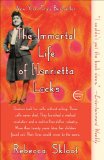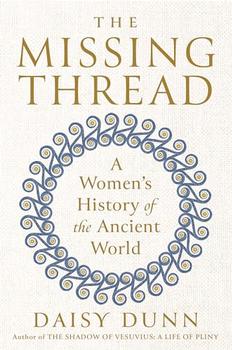Write your own review!
Sharon G
A Question of Ethics?
While the subject's cells were initially (and innocently) gathered in an attempt to treat her illness, what ultimately developed presents many questions of ethics and conscience on the part of the medical profession. Greed and capitalism are also subjects to be discussed.
 Becky H
THE IMMORTAL LIFE OF HENRIETTA LACKS by Rebecca Skloot
Becky H
THE IMMORTAL LIFE OF HENRIETTA LACKS by Rebecca Skloot
It seems silly to go over the “plot” of this biography of Mrs. Lacks again, so I will just say that this non-fiction work details how Mrs. Lacks and her family were lied to, misled, ill informed, taken advantage of and used by the medical community after her cancerous cells were found to be able to multiply indefinitely. Without compensating, or even acknowledging, the person from whom the cells were obtained, her cells were first given away, then sold, in order to advance medical knowledge.
The book is exceptionally well written, reading at times like a medical thriller. But at others, it serves as an introduction to medical/scientific ethics and experimentation. Skloot writes clearly enough so that even those who failed high school biology will get the gist of the medical experience of the Lacks family. Author Skloot becomes a major player in the book when she engages Henrietta’s daughter, Deborah, as friend, mentor and ally. The author’s involvement in the story and with the central players may become a topic for book groups to discuss. How “disinterested” a writer can an author be when they are so intimately involved in their investigation that they become a part of the story. Would the book have been a bestseller if Skloot was not a part of the story? Could it even have been written?
Book groups will find the ethics of the various medical teams to be incredulous in the face of today’s laws concerning medical privacy. Groups may want to investigate the case of John Moore, a “modern” lapse of medical ethics, mentioned briefly in the book.
Aem
Henrietta Lacks
This story was beautifully written it kept me captivated as I read through it. I found it to be informational and very interesting. There wasn't a time where i was reading I thought it was boring. The way she brought Henrietta to life on the pages was amazing. Although I will have to reread it to get over the part about her marrying her cousin. That was weird and I don't understand that but the book was good to read. It showed who she was and I now understand why we used her cells in my high school biology class and compared them to different cells that had been dead for so long. I find that her cells helping out others was inspiring to the science today.
Malcolm
great book
Rebecca Skloot touches on issues that still are burning questions in medical research today. Through the story of a family who lost a member named Henrietta Lacks - a mother, wife, and cousin - to cervical cancer. The doctors took a tissue sample without consent to create the dell culture line HeLa. Through this, Rebecca hits hard on the issues of consents, who owns the rights to the tissues and money and the racial issues and immoral studies on blacks. Great way to bring these issues to attention to all ages and inform the general public about the issues. Great job Rebecca Skloot!
CarolK
Outstanding blend of Science & History
This has been on my TBR list for most of 2010.I knew I wanted to read it as soon as I heard it involved The HeLa Cells. Somewhere in the back of my mind I knew I had heard about these famous cells taken from an African American woman diagnosed with cervical cancer in the 50’s. The cells were taken without her knowledge and without the knowledge of her family. The cells lived, she did not. Meet Henrietta Lacks.
Like the author, Rebecca Skloot, I was curious to know more about Henrietta, to learn more about the details of the cell experimentation, what they have done for science and why they are important to our lives. Skloot is a science journalist and has the credentials to dig into the story and inform. I give her a great deal of credit for the ten years she took to research the book and for having the perseverance to continue to contact Henrietta’s relatives who were reluctant to talk to a reporter. Building trust with the family was not an easy task, but eventually Skloot was able to ensure them that her intentions were good. Though the story could have been told from interviews with doctors and possibly from records at Johns Hopkins, what really brings Henrietta alive in my mind is the personal stories of her kin, particularly her daughter, Deborah.
I liked the format Skloot used to write the book. You can hear what she says about this in the FAQ portion of her website.
Critics of the book complain that Skloot has made this a story of race. Personally, I don’t see how you can begin to know Henrietta and her family without talking about race. But, yes, it is more than that. It’s about informed consent, pharmaceutical companies making mega dollars, treatment of patients, and ethics. It is also the story of the quest of a daughter to better know her mother, who died when she was young. It is a story of this daughter’s love for the woman she comes to know.
I am pleased that Rebecca Skloot has set up Henrietta Lacks Foundation, which this year granted five of the Lacks descendents for their education.
There is much to think about after reading this book. I still have questions. Some of the science goes over my head, but Skloot did a good job keeping this in layman’s terms.
Today, due to privacy laws we would not know the name of the woman that the cells were harvested from. I’m in agreement with this but am still glad that in this case, Henrietta Lacks was identified and that through the efforts of Rebecca Skloot that I have a better picture of who Henrietta was. She never knew her contribution to medicine, but it seems to be significant.
Karen R
Interesting and Enlightening
I recommend this to those who like history and science. The author is to be praised for her exhaustive research into the history of HeLa cells and how they've made an impact on lives around the world. Interesting and enlightening. However, my favorite chapters had to do less with the science aspect but more on the human side of Henrietta and her extended family, who experienced first-hand the poverty and racism in America and the abuse of African-Americans by the American medical community. We learn how each of them dealt with Henrietta's cells being used without their consent and the fact that the production of HeLa cells was commercialized without the Lacks family receiving a penny - most of whom remained poor their entire lives. They couldn't even get health insurance.
 Dorothy T.
Excellent on several levels
Dorothy T.
Excellent on several levels
The author spent much time and exhaustive effort to put together a true story that at times moves along like fiction, and presented characters that had me totally engaged. I loved how the science was told with detail that would satisfy professionals and then told again "in plain English" for readers like me so that I could understand the importance of Henrietta Lacks' part in cell research. Rebecca Skloot holds nothing back--except her own occasional skepticism. This book is not to be missed!
Nancy Needler, Research Subject Advocate
HeLa cell line: Would Henrietta have minded this immortality?
This book was read with enthusiasm from start to finish. The author brilliantly, yet informally, used family memories, historical documents, pictures, medical professional interviews, and her own interpretations to bring into light the actual life of Henrietta Lacks. The story revolves around the fact that cell were taken from her cancer tumor without her knowledge or consent and grown in culture. After her death, these cells were used for scientific discovery and still remain "alive". The effect of this story on her family is remarkably told. On a research subject advocate viewpoint, the 31 year old woman was subjected to unethical use of her body tissues, the multimillion dollar business profited from the selling of the HeLa line, and the Lack family never say a penny (let alone knew of the "immortality" of her family member). On scientific review, these cells enabled informational discoveries for the US medical community for the betterment of society. This story is a must read!




